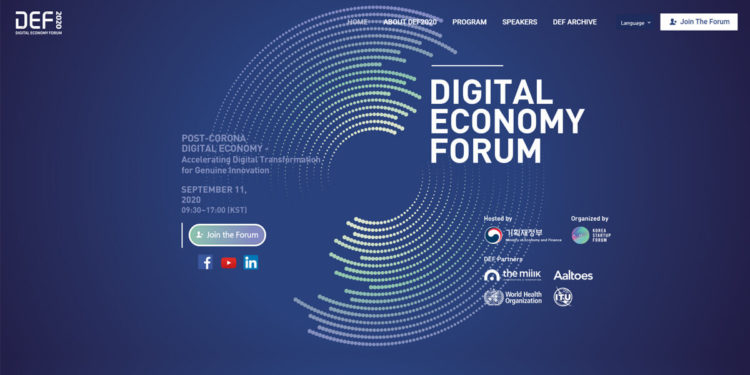South Korea’s Ministry of Economy and Finance with the Korea Startup Forum successfully held this year’s Digital Economy Forum 2020 (DEF2020) on Friday, under the theme of “POST-CORONA DIGITAL ECONOMY – Accelerating Digital Transformation for Genuine Innovation.”
DEF2020 included two keynote speeches and four sessions focusing on four major topics, such as Digital Transformation and Policy, Work and Job, Healthcare, and Entertainment and Media.
The forum’s special session also featured five innovative startups responding and providing solutions to the ongoing COVID-19 pandemic.
Digital Healthcare: Medihere
Medihere introduced the first telemedicine platform in South Korea following the temporary lifting of telemedicine restrictions. This allowed Medihere to provide a remote diagnosis as people fear face-to-face medical treatment amid the coronavirus pandemic treatment.

Kiwhan Kim, CEO of Medihere, said that the company focuses primarily on the U.S. and South Korean markets. He said that Medihere aims to answer the challenges, such as high insurance and medical fees, and the language barrier for Koreans living in the U.S.
Kim said that Medihere would help reduce the premature mortality rate and save about 33 percent of medical fees. Through the telemedicine service, doctors could check patient symptoms and data, and provide prescriptions to a registered pharmacy. The platform provides a subscription service available in English and Korean through its smartphone application.
The digital healthcare startup also applied AI technology to its telemedicine platform to improve its accuracy and efficacy. Medihere also plans to integrate into other devices to create a centralized connected concierge platform.
IT Services: Nowbusking
Nowbusking provides IT services for small businesses that lack resources and capability to digitalize their services. The startup digitalizes services for restaurants, shopping malls, banks, and other businesses where customers expect to wait.

The startup aims to aid small businesses that suffer and fail to adapt to IT services due to the pandemic. Nowbusking’s business-to-business (B2B) service intends to help business owners expand to online services making their operations run efficiently.
Nowbusking’s CEO, Sang Yeol Jeon, said that the platform also increases contract-free services and manages customer information and data, maintaining a connection to their customers. The company leverages IT technology to address inefficiencies, improve businesses’ spaces, and ensure that consumers would patronize them.
Fintech: 8Percent
CEO Hyojin Lee said that 8Percent is a leading South Korean fintech startup in the peer-to-peer (P2P) lending market. The company focuses on P2P financing for individuals and small and mid-size businesses.

Founded in November of 2014, 8Percent provides an alternative capital source for borrowers with midrange credit scores. Lee said that the company leverages the growing mid-loan market implementing the P2P approach to reduce interest rates.
According to Lee, in August, the government enacted the Online Investment Related Finance Act, which further allowed the P2P business to flourish. During the coronavirus pandemic, 8Percent saw a 50 percent rise of users as people opt for contactless financing and payment services. Lee said that this increase in new accounts shows the company’s strength and the acceleration of contact-free finance solutions amid the global crisis.
Artificial Intelligence: 42Maru
South Korean AI startup 42Maru specializes in question-answering (QA) system based on artificial intelligence. The “QA as a Service” uses AI-based deep learning to understand a question and deliver a single answer semantically.

Donghwan Kim, CEO of 42Maru, said that the chatbot gathers information from a large database then gives the most appropriate answer.
Recently, 42Maru gained an award from KGCCI Innovation Awards and Techstars London as it expands to the European market. The company is also making its presence known in other Southeast Asian countries such as Singapore. 42Maru’s application serves a wide range of clients, including LG CNS, Microsoft, Hyundai Motor Group, Samsung Electronics, Doosan, and NVidia.
Kim said that the work from home and contactless service market had grown exponentially during the pandemic. This also increased queries to relevant and public offices about the COVID-19 pandemic. 42Maru’s AI chatbot reduces waiting times and queries, avoiding bottlenecks in information centers.
The company’s Semantic Single Answering applies to business analytics, AI-based chatbots, and smart devices supporting non-contact services. Additionally, the 42Maru’s QA system could be used in shipbuilding and marine engineering, finance, legal tech, smart factory, company help-desks, call centers, regulation and supervision, human resources, and connected car.
Digital Healthcare: Lunit Inc.
The AI-driven software startup Lunit focuses on providing high standard deep learning data-driven medical care services. Since 2013, the company devoted to designing and developing AI-powered imaging biomarkers with high efficiency and accuracy diagnosis and therapeutics of diseases, especially cancer.

In 2018, Lunit launched its web-based AI medical image diagnostic software “Lunit Insight CXR-Nodule” to deliver accurate diagnostics for lung abnormalities such as cancer. Lunit also introduced the Lunit Insight for Mammography (Lunit MMG), its latest breast cancer detection software.
Brandon B Suh, CEO of Lunit, said that Data-driven medicine using deep-learning technology analyzes and accurately detects diseases better than humans, saving time and lives. The startup currently provides its flagship product to South Korea and outside countries such as Italy, Portugal, Brazil, and Indonesia to detect lung aberrations caused by the COVID-19 disease.







